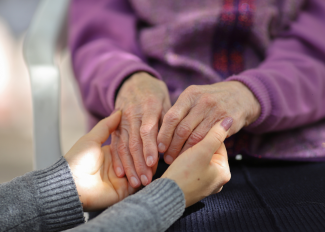If your aging loved one has Alzheimer’s disease or is showing other signs of cognitive decline, you may have questions about what this means and how you can help them continue to live a safe, joyful life at home. At Living Assistance Services in Toronto, we’re dedicated to helping seniors live safely and independently in their own homes for as long as possible. We’re also committed to supporting family caregivers as they navigate logistical, practical and emotional changes in their family. Today, we’re sharing four tips to help family members effectively care for a loved one who has dementia. For more information or personalized advice, please contact us—we’d be glad to hear from you.
Learn from trusted sources
A diagnosis of Alzheimer’s Disease or another condition that causes dementia can be difficult for many families to process, and learning about the stages of cognitive decline can be quite sobering. That said, it’s important to understand and prepare for these stages in order to best support your loved one (and be mentally/emotionally prepared for the changes ahead). We recommend exploring online reading material from the Alzheimer’s Society and the Alzheimer’s Association as a starting point. There are also some great books that may enhance your understanding of cognitive decline and/or caring for a loved one with dementia—here’s a list of titles to consider.
Adapt their home as needed
Individuals with dementia can thrive at home with the right supports in place. In the early stages of dementia, you may want to make minor adjustments such as switching to a phone designed for people living with cognitive impairment or putting visual reminders around the home (for example, a white board with space to write reminders, instructions, etc). As symptoms progress, more significant changes may be needed (door alarms to prevent wandering, adaptive utensils to help at mealtime, etc). Here’s a good list of equipment to support the health and safety of a person living with dementia. For personalized recommendations, please feel free to contact our team.
Take advantage of local resources
If your local hospital, seniors centre or Alzheimer’s organization has a support group for family caregivers of dementia patients, consider taking part at least once. Not only will you have an opportunity to connect with other family caregivers, you may learn about strategies and resources that have helped other families in your situation. It’s worth giving these groups a chance, even if you don’t think you “need” to go or find the idea somewhat intimidating. The Alzheimer Society of Toronto has some excellent community programming, among other organizations in the greater Toronto area.
Put a support system in place
Caring for a loved one who has dementia can be physically, mentally and emotionally draining. While you may continue to have a warm and loving relationship with your aging loved one, cognitive changes aren’t always easy to accept. Even when a loved one doesn’t have dementia or other cognitive issues, being a caregiver is a lot of responsibility. We recommend having both family and professional support in place to distribute care tasks more evenly and help family members avoid caregiver burnout. If you’d like to speak to Living Assistance Services in Toronto about hiring a Personal Support Worker (PSW), please contact us. We’d be glad to answer your questions and provide a personalized quote.
Thanks for reading and please share this information with anyone who may find it useful. Remember: we are always glad to hear from current and prospective clients, and our phone lines are available 24 hours a day, 7 days a week.

